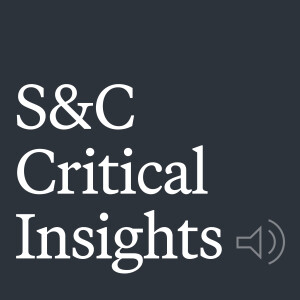
82.1K
Downloads
229
Episodes
Sullivan & Cromwell present the S&C Critical Insights podcast. Topics include M&A trends across industries, corporate governance including shareholder activism, litigation, arbitration, products liability, and more.
Sullivan & Cromwell present the S&C Critical Insights podcast. Topics include M&A trends across industries, corporate governance including shareholder activism, litigation, arbitration, products liability, and more.
Episodes

Tuesday Jan 11, 2022
M&A Trends and Highlights: 2021 in Review and a Look Ahead
Tuesday Jan 11, 2022
Tuesday Jan 11, 2022
In this episode of S&C’s Critical Insights, Senior M&A Partner Frank Aquila and Global Head of M&A Melissa Sawyer look back on global M&A activity during 2021 and discuss deal making expectations in 2022. Frank and Melissa explore the factors that made 2021 a historic year for M&A deal making—including the SPAC phenomenon, the splitting of major conglomerates, the rise of ESG as a catalyst for deals and the recovery from the pandemic-induced downturn. They further examine how these trends will continue to develop in the new year.
Visit us at www.Sullcrom.com

Monday Jan 10, 2022
Non-GAAP Financial Measures
Monday Jan 10, 2022
Monday Jan 10, 2022
In this episode of S&C’s Critical Insights, John Savva and Sarah Payne discuss non-GAAP financial measures, numerical measures of a company’s financial performance, and financial position or cash flows that are not determined under GAAP. Sarah and John also explore the SEC’s requirements applicable to non-GAAP financial measures, some key areas to focus on in the presentation of these financial measures and the importance of complying with the various requirements that apply to non-GAAP financial measures.

Tuesday Dec 14, 2021
Safely Navigating a Liquidity Crisis as a Public Company Director
Tuesday Dec 14, 2021
Tuesday Dec 14, 2021
In this episode of S&C’s Critical Insights, Andy Dietderich and Melissa Sawyer discuss how their disciplines of M&A, corporate governance and restructuring combine to protect public company directors during a liquidity crisis. They explore director duties in what used to be called the “Zone of Insolvency,” with a focus on current Delaware law. They also discuss hypothetical situations in which directors might find themselves while steering a distressed company through a storm.

Wednesday Dec 08, 2021
The Impact of Brexit on Choice of Law
Wednesday Dec 08, 2021
Wednesday Dec 08, 2021
In this episode of S&C’s Critical Insights, Vanessa Blackmore, Ben Perry and Kirsten Rodger discuss whether Brexit has changed thinking about which law should govern a contract, and which courts should have jurisdiction over disputes. They explore why English governing law remains just as valid a choice as it did before Brexit and why the English courts continue to be well placed to handle disputes that arise.
Visit us at Sullcrom.com

Monday Dec 06, 2021
Developments Affecting 10b5-1 Trading Plans
Monday Dec 06, 2021
Monday Dec 06, 2021
In this episode of S&C’s Critical Insights, Sarah Payne and Cathy Clarkin discuss the latest developments relating to 10b5-1 trading plans. They explore several proposed reforms by the SEC, which include a cooling off period between entering a newly adopted or modified plan and making an initial trade, a prohibition on overlapping plans and mandatory disclosure requirements. They also discuss considerations relating to current plans given the prospect of these pending rules.
Please visit us @ Sullcrom.com

Thursday Dec 02, 2021
Thursday Dec 02, 2021
In this episode of S&C’s Critical Insights, Sarah Payne, managing partner of S&C’s Palo Alto office, and M&A partner Matt Goodman are joined by Davis Wang, co-head of the Firm’s Tax Group, and Bachir Karam, a partner in the Firm’s Estates & Personal Group, to discuss proposed tax changes under the Build Back Better Act.
The Build Back Better Act passed in the House on November 19 and is now before the Senate. The partners discuss how proposed tax changes in the bill might have significant impacts on founders, companies and venture capital firms in Silicon Valley.

Friday Nov 05, 2021
S&C Critical Insights – Refreshing the Director Onboarding Process
Friday Nov 05, 2021
Friday Nov 05, 2021
In this episode of S&C’s Critical Insights, Sarah Payne and John Savva explore director onboarding, a process that may need to be refreshed in light of increased board turnover and expansion as companies seek to increase board diversity, as well as the increase in newly public companies. John and Sarah discuss four areas in particular that should be reviewed and updated: roles of directors, fiduciary duties, communications and risk oversight.

Thursday Nov 04, 2021
New DOJ Initiatives Address Nation’s Cybersecurity Infrastructure
Thursday Nov 04, 2021
Thursday Nov 04, 2021
In this episode of S&C’s Critical Insights, Tony Lewis and Kamil Shields discuss two Department of Justice announcements—the launch of a Civil Cyber-Fraud Initiative and the creation of a National Cryptocurrency Enforcement Team. They also explore how these measures, alongside a series of recent high-profile cybercrime incidents and enforcement actions, fit into the DOJ’s comprehensive cyber strategy following the issuance of recent DOJ policy related to cryptocurrency enforcement and President Biden’s executive order to strengthen the nation’s cybersecurity infrastructure.

Monday Nov 01, 2021
Managing Cheap Stock in an Initial Public Offering
Monday Nov 01, 2021
Monday Nov 01, 2021
In this episode of S&C’s Critical Insights, John Savva and Sarah Payne discuss cheap stock, a significant factor in many initial public offerings. They explore how the issue arises in the context of an IPO, the types of cheap stock comments typically issued by the SEC, and how a company might navigate these comments. They also discuss steps to take to reduce the likelihood of a cheap stock issue.
Visit us at Sullcrom.com

Monday Oct 25, 2021
Lessons From the 2021 Proxy Season: Governance Proposals
Monday Oct 25, 2021
Monday Oct 25, 2021
Marc Treviño and Melissa Sawyer, co-heads of S&C’s Corporate Governance and Activism practice, continue their discussion of shareholder proposal trends from the 2021 proxy season. In this episode of S&C’s Critical Insights, they explore developments in governance proposals, which went to a vote more often than any other category of proposal this year despite a decline in prevalence.
